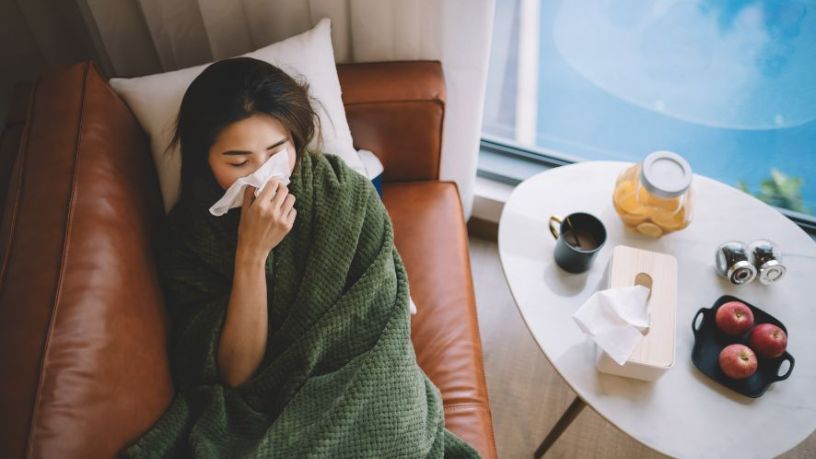Hay fever is common in Australia but should not go untreated.
On this page
Key takeaways
Anyone can experience symptoms of hay fever and there are several different ways to help reduce them.
Proper use of medications and preventative methods means many hay fever sufferers can get relief from their symptoms.
Hay fever (or allergic rhinitis) affects around 18% of Australians.1 It impacts children and adults and can occur seasonally (spring and summer) or throughout the year.2
One of the simplest hay fever treatments is to avoid or limit your exposure to allergens or triggers such as pollen, mould, dust or animal dander (skin, fur, saliva) as much as possible.
However, this is not always possible. Over the counter (OTC) remedies or medication prescribed by your doctor can help manage and treat hay fever symptoms.
In some cases, you may need more than one hay fever treatment to target different symptoms that are causing you discomfort.
For example, you may need a product to help with a blocked nose and another to help with itchy eyes.
Long-term treatments, such as allergen immunotherapy, can be used to try to reduce and/or eradicate symptoms altogether.
Hay fever treatments
Avoidance
If you know what triggers your hay fever, you may be able to avoid the cause altogether or at least reduce your exposure to it. Some of the most common hay fever triggers and how to avoid them are listed below.3
To avoid or reduce dust:
- regularly damp-dust and vacuum around beds
- wash bed linen once a week in hot water
- reduce soft toys, carpeting, curtains and rugs around beds
- use dust mite covers on pillows, mattresses and other covers and blankets.
To avoid or reduce pollen exposure:
- keep windows closed on windy days
- dry bedding and clothing inside away from trees and grass
- change clothing when you come indoors
- keep hair tied up under a cap while outside and wearing sunglasses
- wash your face and hands when you come home.
To avoid or reduce mould:
- keep indoor areas well ventilated
- consider using a dehumidifier if some rooms are damp
- dry clothes and linen outside or away from where you sleep
- keep all areas clean and free of damp or wet clothing.
To avoid or reduce pet dander (skin, saliva, fur):
- keep all pets out of bedrooms and off beds
- limit contact with pets once you’re showered and ready for bed
- keep pets outside.
OTC (over the counter) medications
Identifying the allergen or allergens causing the symptoms is an essential part of managing hay fever. However, if the cause or trigger is obvious and symptoms are mild, you can get access to pharmacy-only or OTC medications.
If used properly, OTC medications can help to significantly reduce symptoms of hay fever in some people. Always get advice and direction from your GP before starting any new medication or supplement.
Remember to let your healthcare provider know if you have any pre-existing health conditions or are taking other medication.
Always check and follow instructions on the label before giving any hay fever treatments to babies, children or pregnant individuals.
Corticosteroid nasal sprays
These nasal sprays help prevent and treat nasal inflammation and contain a very low dose of steroids.4 They are one of the most effective hay fever medications and can help with a runny nose and nasal itching.
They need to be used regularly and as directed to be effective, and are often the first type of hay fever treatment prescribed to help with hay fever relief. They are a safe, long-term treatment for most people and side effects are rare.
[Dr Simon Benson stands in a medical office facing the camera].
Simon Benson: Hi, I'm Dr Simon Benson.
It's that time of year when the pollen's coming out, it's spring. But with spring, people do get hay fever.
What are the symptoms of hay fever? Runny nose, sneezing and itchy eyes.
If you have any of these, but you're well, you can head down to your local chemist for some advice.
One of the things that they might recommend to you is a nasal spray, like this one.
There are lots on the market that could help with your symptoms.
I'm going to show you how to use a nasal spray. Did you know that there is a right way and a wrong way to do it? And I'm going to show you how to do it the right way.
The first thing to do: take off the cap.
Give it a little shake, and if it's the first time you're using it, or you haven't used it for a little while, give it a good squirt, just to make sure a full dose comes out like that.
When you're ready, blow your nose. This helps clear out some of the mucus, and lets the medicine get to work in all the right places.
When you're ready, tilt your head forward, like this.
[Dr Benson demonstrates how to insert the nasal spray into a nostril, and leans slightly forward].
Cover one nostril with your finger, place the nasal spray into the other nostril, breathe out.
When you're ready, start a long, slow, deep breath in through your nose.
Whilst you're breathing in, press the spray to deliver a dose, and continue breathing in all the way to the end of your breath through your nose.
When you reach the end of your breath, you can breathe out, and repeat on the other side.
Sometimes, a little bit of clear fluid can come out of your nose. That might mean that the medicine hasn't gone into the right spot. So next time, try leaning a bit further forward or angling the spray a little further back.
And if you get into difficulty, pop into your local chemist for some advice.
Try not to blow your nose afterwards, 'cause you might blow out some of the medicine and stop it from doing its job properly.
If you breathe in too hard, you might get a little bit on the back of your throat, which could give you a bit of a funny taste.
Try breathing a little slower next time, and again, see your chemist if you have any further problems.
Antihistamines
Antihistamines may help with sneezing, itchy or runny eyes, itchy or runny nose and itchy throat.
Antihistamines work by blocking the chemical histamine, which is released by the immune system during an allergic reaction.
Oral antihistamines come in tablets in 2 forms: sedating and non-sedating.
Sedating antihistamines can be helpful to aid in sleep if your hay fever symptoms are keeping you awake, but should not be used if you’re driving or operating heavy machinery.
People who suffer from epilepsy and glaucoma should also exercise caution with this form of antihistamine.
Doctors will often recommend a non-sedating antihistamine for hay fever relief, but even some of these can cause drowsiness.
Antihistamines are also available as a nasal spray over the counter, which can act faster than tablets. They help with sneezing and an irritated, runny nose caused by exposure to allergens.
Antihistamine eye drops can help with itchy, swollen or teary eyes. Speak to your GP about what type of antihistamine is right for you and your needs.
Decongestants
Decongestant medicines reduce swelling and congestion in the nasal passage, and work by narrowing the blood vessels in your nose. They are designed for short-term use only and are usually only used as hay fever remedies if antihistamines and corticosteroid nasal spray treatment haven’t helped.
Decongestant nasal sprays shouldn’t be used for more than 3 days at a time, as they can damage the lining of the nose and make symptoms worse.
Decongestants are available in tablets as well. Oral decongestants should only be used as a short-term medicine for hay fever allergies and can cause side effects like insomnia, anxiety or restlessness. Those with diabetes, heart problems, high blood pressure, glaucoma, hyperthyroidism, urinary retention and those taking MAOI antidepressants should avoid taking oral decongestants. Always speak to your doctor before taking any medication.
Saline
Using salt-based nasal sprays or rinses can provide hay fever relief by flushing out allergens (such as pollen) from the lining of your nose.5
You can buy rinsing devices like squeeze bottles or saline nasal sprays from the pharmacy. Read instructions and only use age-appropriate solutions with children.
Prescribed medications
Your doctor may recommend a prescription-only medication to treat your hay fever symptoms.6
Nasal corticoid sprays with antihistamine may need a prescription.
Talk to your GP about what the best treatment approach is for you and your needs.
Immunotherapy
Also called desensitisation therapy, immunotherapy involves regularly receiving small amounts of allergens, either orally or by injection, over several years, although people may start to see improvements within a few months.7
Exposure to the allergens in increasing amounts improves tolerance to allergens and reduces symptoms. It can be particularly effective for allergies to cat fur, dust and pollen from trees or grass.
To receive immunotherapy, you need to know what you are allergic to and will need to see an allergy specialist or immunologist who will give you an allergy test. Your GP can provide a referral. While the tests are accurate and the treatment has a high success rate, it can be expensive. Check with your private health provider to see if you are covered within your current policy.

Want to breathe easier?
Resources
Allergy & Anaphylaxis Australia has online support resources available. You can also call for help and support on 1300 728 000.
Allergy 250K provides support for teenagers and young adults.

At Bupa, trust is everything
Our health and wellbeing information is regularly reviewed and maintained by a team of healthcare experts, to ensure its relevancy and accuracy. Everyone's health journey is unique and health outcomes vary from person to person.
This content is not a replacement for personalised and specific medical, healthcare, or other professional advice. If you have concerns about your health, see your doctor or other health professional.
1Australian Society of Clinical Immunology and Allergy. (2023). Allergic rhinitis (hay fever) - fast facts. Australian Society of Clinical Immunology and Allergy.
2Healthdirect. (2022). Hay fever. Healthdirect.
3Australian Society of Clinical Immunology and Allergy. (2024). Allergen minimisation. Australian Society of Clinical Immunology and Allergy.
4Healthdirect. (2022). Hay fever. Healthdirect.
5Allergy & Anaphylaxis Australia. (2017). Saline washes for allergic rhinitis. Allergy & Anaphylaxis Australia.
6National Asthma Council. (2024). Allergic rhinitis treatments. National Asthma Council.
7Allergy & Anaphylaxis Australia. (2024). Immunotherapy for allergic rhinitis (hay fever). Allergy & Anaphylaxis Australia.
You might also like...
5 natural hay fever remedies
Treating hay fever with medication might not always be ideal. Learn 5 natural remedies that can help relieve your symptoms.
Hay fever: A quick guide
You might deal with hay fever every year, but how much do you actually know about the allergic condition? Discover the basics with this quick guide.
Allergies: What they are, why you get them and what to do
Allergies are common in Australia, but many people don’t get diagnosed or treated properly. Find out how you can manage some common allergies.
Asthma, hay fever and eczema: What you need to know
Allergic diseases such as asthma, eczema and hay fever often occur together. Learn about each condition and how to manage it.





